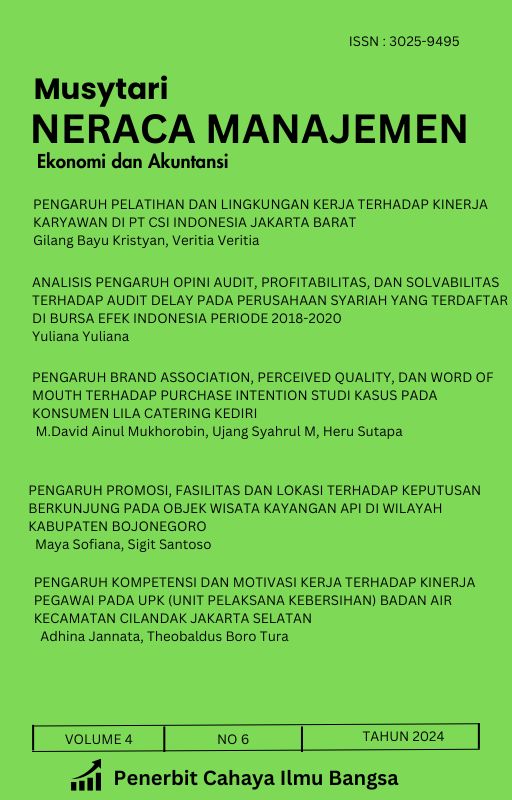THE INFLUENCE OF WORLD OIL PRICES, WORLD GOLD PRICES, INFLATION, EXCHANGE RATES AND INTEREST RATES ON THE COMPOSITE STOCK PRICE INDEX FOR THE PERIOD 2014-2023.
Published 2025-06-15
Keywords
- Composite Stock Price Index,
- World Oil Price,
- World Gold Price,
- Inflation,
- Exchange Rate
- Interest Rate ...More
How to Cite
Abstract
The research attempts to ascertain the partial or simultaneous effects of inflation, interest rates, exchange rates, global oil and gold prices, and inflation on the composite stock price index. IBM SPSS software version 27 was utilized in this study's data analysis procedure. Non-purposive sampling is one of the sample approaches used in this research to gather secondary data, namely information on global oil and gold prices, inflation, interest rates, and currency rates. The findings demonstrated that: 1) the composite stock price index is positively and significantly impacted by global oil prices. 2) The composite stock price index is negatively and negligibly impacted by global gold prices. 3) The composite stock price index is negatively and negligibly impacted by inflation. 4) The composite stock price index is positively and significantly impacted by the exchange rate. 5) The composite stock price index is negatively and negligibly impacted by interest rates. 6) Global gold and oil prices, inflation, interest rates, and currency rates. have a substantial and favorable impact on the composite stock price index at the same time. This indicates that the independent variables of world oil and gold prices, inflation, exchange rates, and interest rates account for 59.4% of the variation in the composite stock price index dependent variable, with other factors not included in this study accounting for the remaining 40.6%.
References
- A. Rozi. (2019). The Effect of World Oil Prices, World Gold Prices, Inflation, Exchange Rates and Interest Rates on the Composite Stock Price Index. Journal of Business Research, Vol. 16, No. 1, pp. 88-102.
- Ambarwati. (2022). The Effect of World Gold Prices on the Composite Stock Price Index. Journal of Finance and Banking, Vol. 10, No. 2, pp. 123-135.
- Basit, A. (2020). The Effect of World Oil Prices on the Indonesian Economy. Journal of Economics and Business, 12(1), 45-60.
- Dewi Anggraeni, & Siti Nurjanah. (2023). The Effect of Exchange Rates on the Composite Stock Price Index. Journal of Economic Research, 12(4), 34-50.
- Eduardus Hena. (2023). The Effect of World Oil Prices on the Composite Stock Price Index. Journal of Economics and Business, Vol. 11, No. 3, pp. 110-126.
- Ghozali, I. (2020). Quantitative & Qualitative Research Design for Accounting, Business, and Other Social Sciences. Yoga Pratama.
- Gaur, V., & Bansal, A. (2019). The relationship between gold prices and stock market indices: Evidence from India. International Journal of Financial Studies, 7(3), 34-50.
- Irine Melyani. (2021). The Effect of Interest Rates on the Composite Stock Price Index. Journal of Economics and Management, Vol. 8, No. 3, pp. 201-215.
- Natshir, M. (2014). Inflation and Its Impact on the Indonesian Macroeconomy. Journal of Macroeconomics, 5(1), 15-30.
- Purnasari, et al. (2022). The Effect of Interest Rates on the Composite Stock Price Index. Journal of Economics and Public Policy, 6(2), 99-115.
- Ratnaningtyas. (2020). The Effect of Inflation on the Composite Stock Price Index. Journal of Economics and Development, 4(1), 22-35.
- Siti Syiam Wandawati. (2024). The Effect of World Oil Prices on the Composite Stock Price Index. Journal of Investment and Finance, 9(2), 44-59.
- Sunarto. (2023). The Effect of Inflation on the Composite Stock Price Index. Journal of Economics and Finance, 2(3), 67-81.
- Sylvi Alfa Centauri. (2023). Inflation and its impact on investment in the capital market. Journal of Economics and Public Policy, 14(1), 55-70
- Tandelilin, E. (2019). Interest Rates and Their Relationship with Stock Prices. Journal of Finance and Investment, Vol 5 No 3, 45-60.

